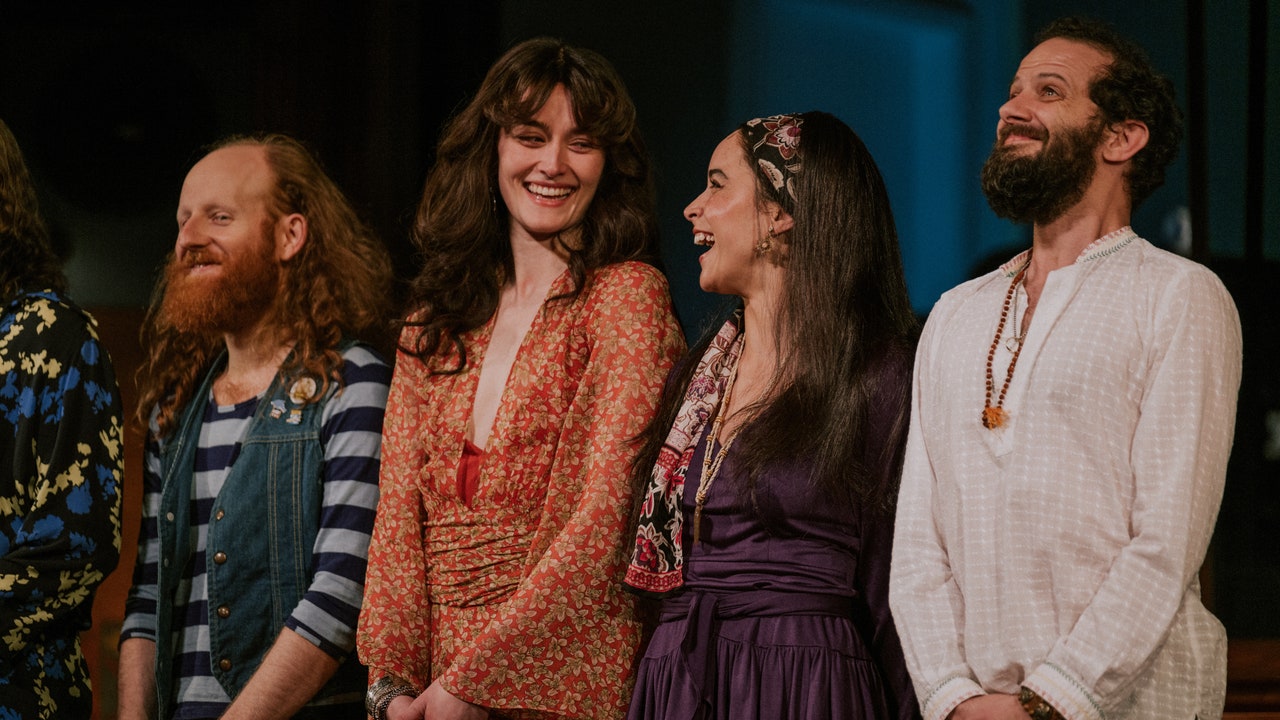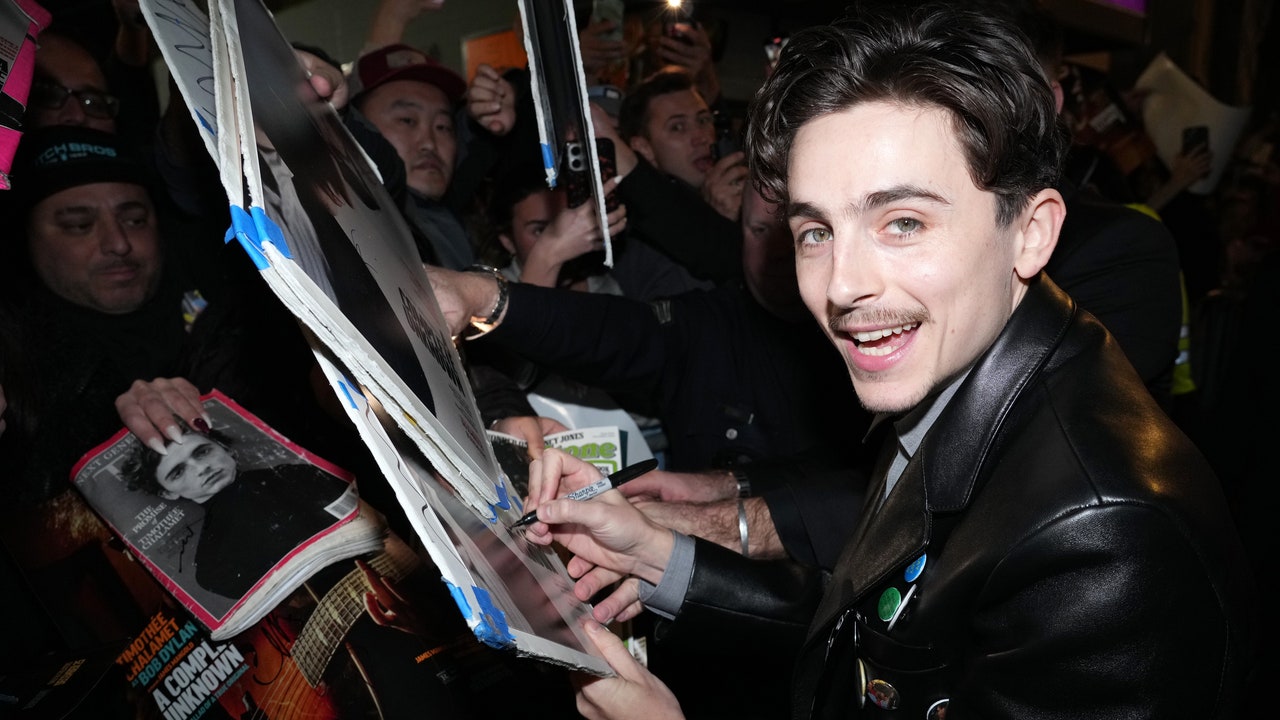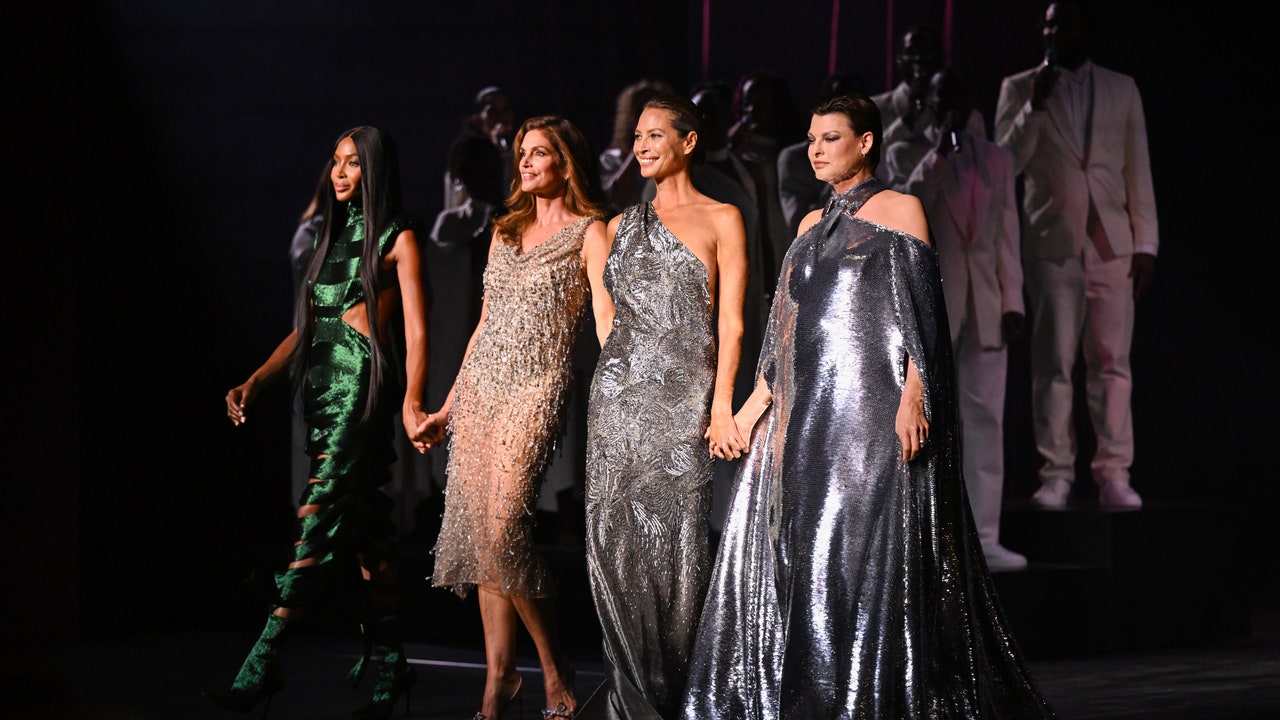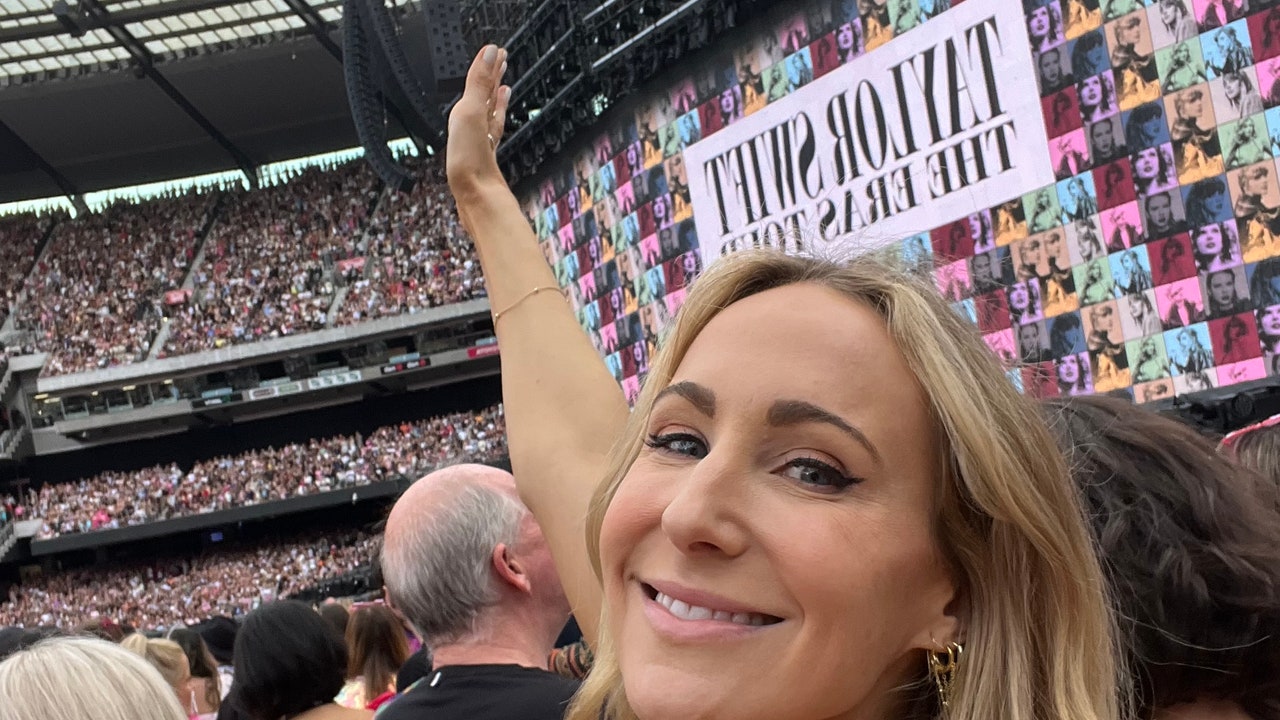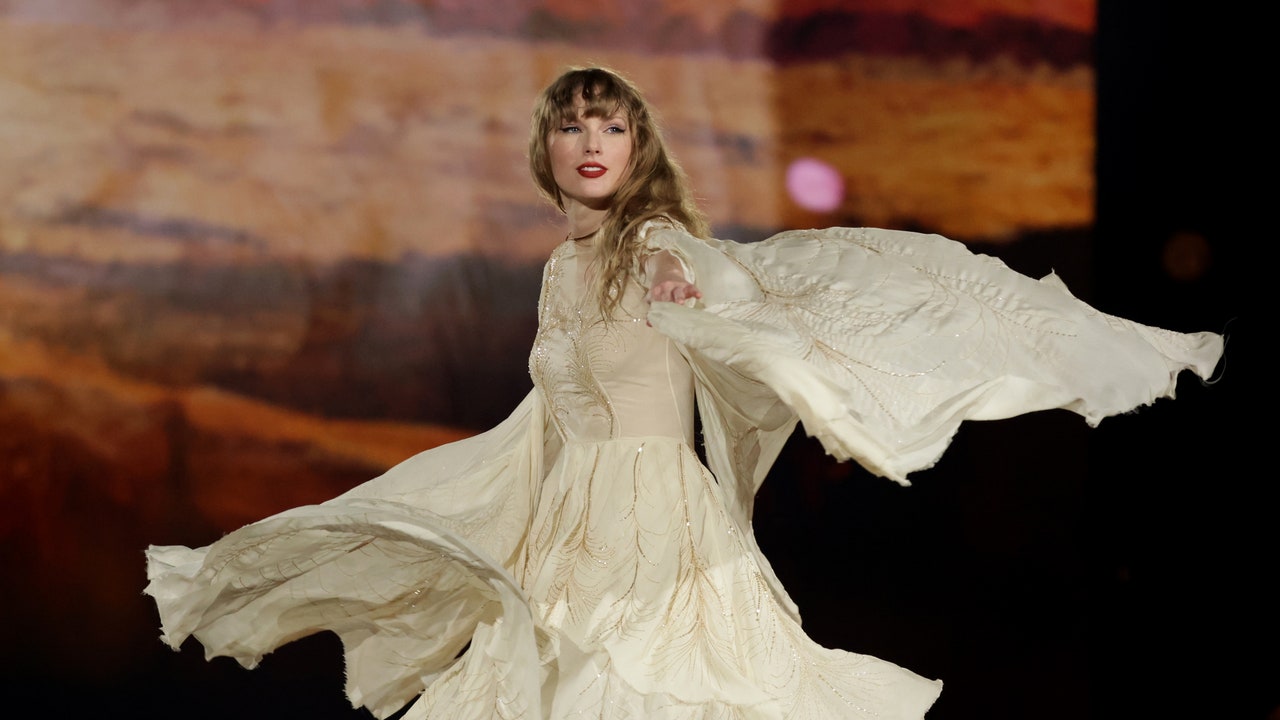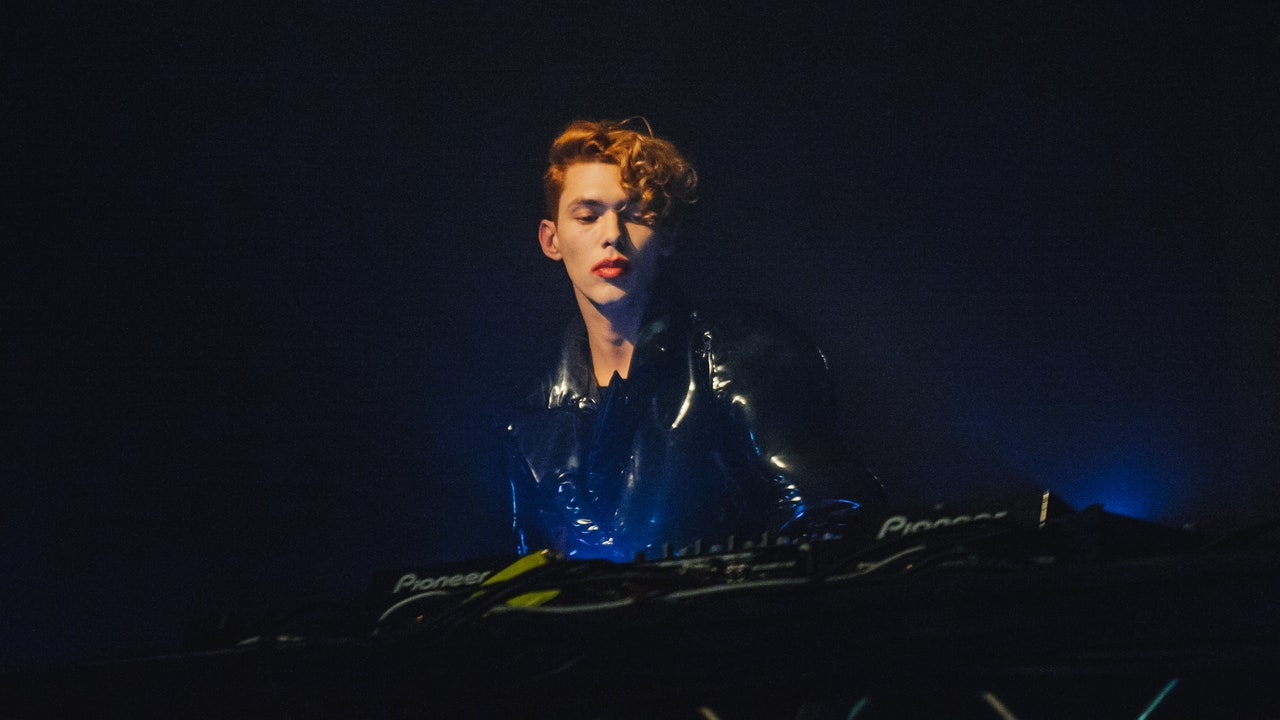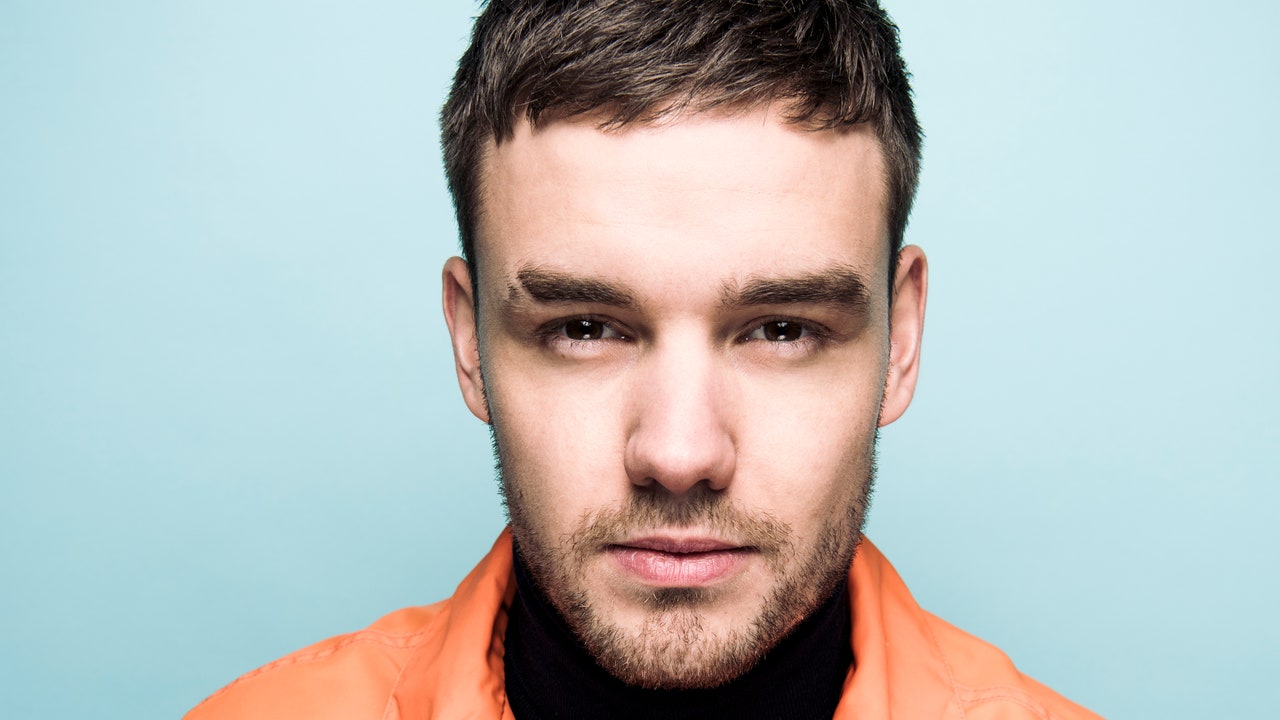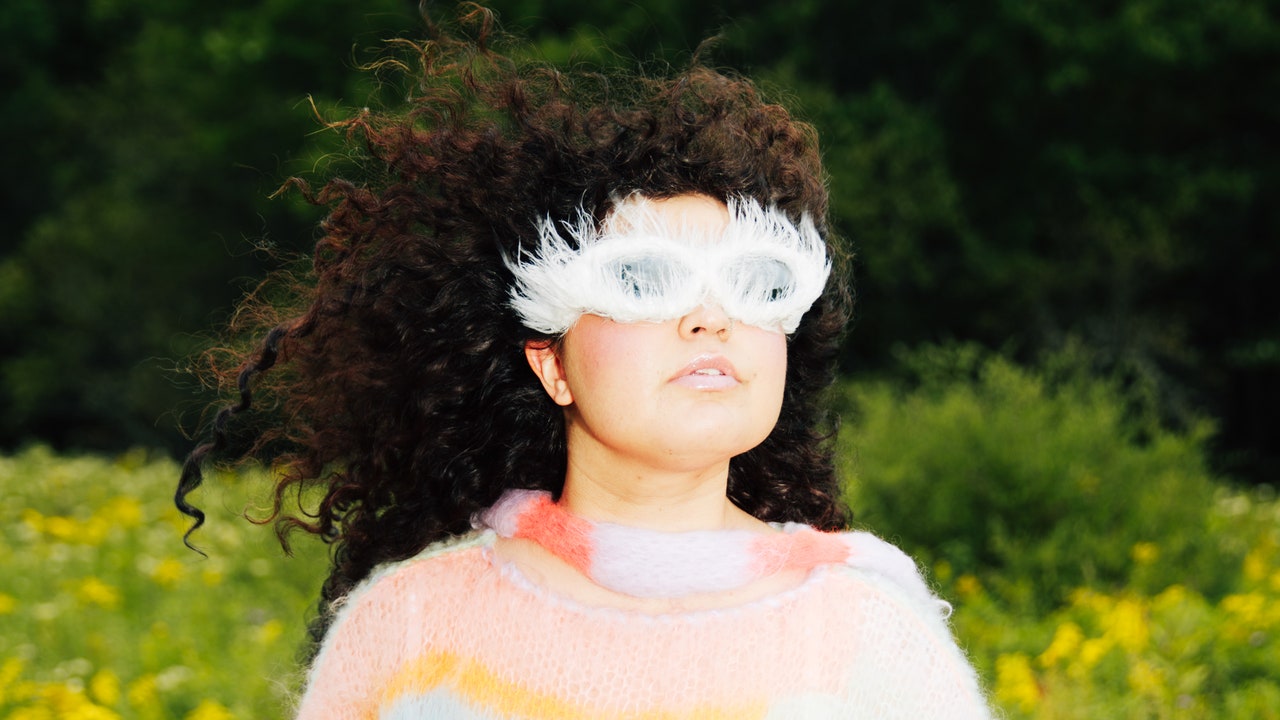Este filme sobre un diseñador de moda de mediados de siglo (Daniel Day-Lewis) y su musa (Vicky Krieps) presenta un deslumbrante vestido color malva, una melancólica interpretación de “Auld Lang Syne,” y Day-Lewis buscando a Krieps en un salón de baile lleno de juerguistas disfrazados, creando una víspera de Año Nuevo difícil de olvidar.
Harmony of Stars: Sarah Pidgeon & Juliana Canfield’s Melodic Broadway Journey
An unusual occurrence affects time throughout Stereophonic, a brilliant play by dramatist David Adjmi and directed by Daniel Aukin at the John Golden Theatre in New York. The production, lasting three hours and 10 minutes, encapsulates an entire year, spanning June 1976 to June 1977, during which a band—comprising vocalist Diana (Sarah Pidgeon), lead guitarist Peter (Tom Pecinka), keyboardist Holly (Juliana Canfield), bassist Reg (Will Brill), and drummer Simon (Chris Stack)—is engaged in creating their upcoming album, with engineers Grover (Eli Gelb) and Charlie (Andrew R. Butler) overseeing the soundboard. And, to clarify, those three hours and 10 minutes don’t whiz by. This is a play that luxuriates in silences—whether strained, astonished, or melancholic—just as much as it does in boisterous noise. (Will Butler of Arcade Fire crafted the tracks, which the performers play on authentic instruments.) The intricately designed recording-studio set, by David Zinn, remains constant, so it’s understandable if you’re unsure how much time has progressed by Act I’s conclusion (a month), or oblivious that by Act IV, they’ve moved from Sausalito to Los Angeles.
Yet the narrative, such as it is—anchored in the occasionally tense, often monotonous, and sometimes enlightening journey of creating art—casts a captivating charm. Stereophonic had a packed-off-Broadway season last autumn at Playwrights Horizons, preceding its Broadway relocation this April, where it garnered further praise (and four Drama League Award nods). Both Sarah Pidgeon, 27, and Juliana Canfield, 32, allude to grand, intangible forces (“the universe”; “a great deal of mysticism”) when queried about what initially drew them to the work.
Pidgeon—previously recognized for her characters in Prime Video’s The Wilds and Hulu’s Tiny Beautiful Things—auditioned for the play last May, having first read for it in March 2020. (The pandemic hindered plans for a spring 2021 performance.) Those intervening years turned out to be crucial for her portrayal of the introspective, slightly anxious Diana; emotional nuances she could merely attempt at 23 now hold more significance in her later 20s. “There were themes she discussed that I could now identify within my own experiences,” Pidgeon notes on a Tuesday morning during previews. Not only did the disintegrating romance between Diana and Peter—who converse, then argue, about aspirations, professional stresses, and parenthood—appear less obscure to her than previously, but Pidgeon’s viewpoint on her own artistry had also matured significantly. Diana, who contemplates her rockstar persona more directly than any other band member, “doesn’t entirely comprehend her authority and influence [as a lyricist], because she depends heavily on her partner to bring it to fruition,” Pidgeon elucidates. As an actress, she could identify that self-awareness. “There’s so much refusal in this field,” she states. “I believe it can nurture a lot of self-doubt and reconsideration, this belief that you can’t perform this role unless several individuals decide they want to employ you and provide the opportunity.”
Timothée Chalamet’s Wild Ride: The Unexpected Brilliance of the Complete Unknown Press Tour
The occurrence initiated with an entertaining appearance at his personal doppelgänger competition, a New York function that sparked an international pop culture sensation. The event drew such significant attention that one Timothée wannabe found himself apprehended, leading to the gathering being halted by authorities. Chalamet’s spontaneous participation was praised as “the most humorous act he could have possibly performed,” and let’s face it: it truly was.
Captivating Highlights from Vogue World’s Iconic New York and London Showcases
Trouvez ici toute la couverture de Vogue sur Vogue World 2024 à Paris !
Vogue World: Paris 2024 s’approche à grands pas, et tandis que nous anticipons avec enthousiasme ce que la Ville Lumière réserve, il y a une multitude d’histoires de mode déjà emblématiques à explorer des deux premières éditions, à New York (2022) et Londres (2023). Avant le spectacle de dimanche, revisitez ci-dessous tous les meilleurs moments des précédents Vogue Worlds.
Serena Williams lançant Vogue World: New York en Balenciaga sur mesure
How Taylor Swift Became Part of Comedian Nikki Glaser’s Identity: Attending 22 Eras Concerts
“I can extend the conversation! Apologies for providing such verbose replies,” Nikki Glaser conveys when we reach the 40-minute mark designated for our telephonic discussion. The focus of our dialogue? Not her double Emmy-nominated Max special Someday You’ll Die, nor the track she penned and recorded for it, nor the unforgettable one-liners she fired in Netflix’s The Roast of Tom Brady, either. (The web widely crowned Glaser the most hilarious—and ruthless—of all the roasters.) “I could discuss Taylor Swift endlessly,” she mentions. And indeed, that’s why we’re talking: to grasp how, amid an incredibly hectic phase in her profession, Glaser has managed to attend 17 of Taylor Swift’s Eras concerts with undiminished enthusiasm. By the tour’s conclusion, the count will reach 22.
Ultimately, the explanation is quite straightforward: “It makes me feel extremely happy. I’ve stopped drinking and try to avoid substances—and truly, this feels like a superb drug,” she explains. “I’m somewhat addicted.” Admirers have frequently noticed her, seated not in the star-studded VIP enclosures but in the general seats, donning glittering outfits and belting out tunes as if nobody is observing. It’s pure delight, with a capital D.
“I feel a bit melancholic at the thought that it will eventually conclude, and I’ll likely need to substitute it with something new,” she muses during the call. “However, it’s not causing harm to anyone, so I embrace it. The more I accept it, the less I feel ashamed by it. At this juncture in my life, I’m not embarrassed by it in the slightest, or I wouldn’t be discussing it with you.”
Without delay, Glaser on Swift:
Taylor Swift’s Informed Decision: Why She Stands Behind Kamala Harris for President
After numerous weeks of whispers and conjecture about when, or even if, Taylor Swift might lend her endorsement to vice president and 2024 Democratic contender Kamala Harris for presidency, the renowned artist finally made her stance known emphatically on Tuesday night. She broadcasted her backing for the Democratic candidate on social media shortly subsequent to Harris’s debate with ex-president and 2024 Republican contender Donald Trump.
In an Instagram post featuring herself and her feline companion (a subtle nod to J.D. Vance’s viral comment about the stereotype of the “childless cat lady”), Swift expressed: “I will be voting for Kamala Harris and Tim Walz in the 2024 Presidential Election. I’m choosing @kamalaharris because she advocates for the rights and issues that, in my opinion, necessitate a champion.”
She elaborated: “I consider her a steady, talented leader, and I’m convinced that we can achieve much more in this nation under leadership that favors calmness over disarray. I was inspired by her choice of running mate @timwalz, who has been advocating for LGBTQ+ rights, IVF, and a woman’s autonomy over her body for years.” Besides denouncing Trump’s deceptive use of AI to create the illusion that Swift had supported him, Swift also encouraged her supporters to verify their voter registration for the 2024 election, providing a link to the Vote.gov website in her Instagram stories.
I’m not claiming that Taylor Swift is solely responsible for saving democracy, but…have you noticed the influence of the Swifties for Kamala? With her dedicated fanbase rallying, it seems quite possible that Swift might indeed have an impact on this election. Harris’s running mate, Tim Walz, for instance, certainly seems to think so, acknowledging Swift’s statement shortly after she shared it.
“I’m thankful to Taylor Swift, and I speak as a fellow cat enthusiast,” he relayed to Rachel Maddow late on Tuesday. “Her words were articulate and direct, and that’s the bravery America is in need of.”
Sophie’s Posthumous Album: The Last Vanishing Showstopper
Certain young women wish to gain recognition, whereas others opt to maintain an aura of mystery. The Scottish-origin artist and producer Sophie resonated with those who chose to stay behind the controls despite weaving their own enchanting creations—and Sophie, her posthumous album, endeavors to balance these contrasting philosophies.
Renowned for her gritty, glitch-infused production style in her forceful music, Sophie nurtured a markedly private public persona, staying largely enigmatic outside her artistic moniker until her announcement as a transgender woman in 2017. She was both composer and curator of her own visual and musical identity; however, she exuded more than anything an ethereal alien uniqueness. During her time, Sophie produced one studio album—the highly regarded, Grammy-nominated Oil of Every Pearl’s Un-Insides (2018)—and a mixtape, and both were heavily instrumental, with several tracks anchored by a singular phrase reiterated endlessly, stretched near linguistic breaking point until robotic chaos and distortion took the helm. Her initial releases, such as 2015’s “BIPP” and “Lemonade,” lingered in the air without clarity on their context or creator. (In 2021, Vince Staples recollected that numerous people conjectured Sophie was simply another venture by A.G. Cook.) The 2017 video for “It’s Okay to Cry”—introducing Sophie’s visage to most admirers for the first time—situated her against a dynamically changing environment of clouds, rainbows, and a star-speckled night sky, embracing a state of in-betweenness, while the exuberantly avant-garde video for “Faceshopping” from 2018 delighted in vivid transformations of her image. Harron Walker has earlier commented on the “dissociative” nature in Sophie’s compositions, illustrating how it encapsulates the experience of being concurrently present and absent, within the same physical form. Sophie tapped into a more celestial dimension, where forms weave in and out of perception amid the pulsating lights of the club.
Tragic Loss: Liam Payne, Beloved One Direction Star, Passes Away at 31
Liam Payne, the vocalist and composer who gained global acclaim as part of the British pop ensemble One Direction, passed away on Wednesday aged 31 following a fall from the third storey of a hotel in Buenos Aires, Argentina. Although specifics surrounding Payne’s descent remain unconfirmed, a wave of sorrow from both celebrities and admirers has swiftly emerged across social media in response to the announcement of his demise.
X content
This material is also accessible on the platform it originated from.
X content
This material is also accessible on the platform it originated from.
Remi Wolf’s Visionary Voyage
At times, when Remi Wolf discusses her brand-new album, Big Ideas, she seems to enter autopilot mode, her form functioning without any commands from her mind. During a recent chat, while she elaborates on studio arrangements in her smooth alto (“We recorded at Electric Lady in New York, also at Conway in LA…”), she casually reaches over and swipes a french fry from my plate.
“Would you like some ketchup?” I offer her.
Instantly, the trance is shattered, leaving Wolf in a state of sheer surprise. She bursts into laughter. “Oh my gosh, I’m just, like, chit-chatting and eating your fries!” she exclaims. “I was just…zoned out.”
There exists a humorous disconnect between 28-year-old Wolf’s angelic visage, framed by a halo of dark curls, and her inclination to sprinkle her dialogue with “fucking” and “dude.” (She also possesses a wonderfully unique fashion sense: for our meal, she sports a long-sleeve tie-dye shirt, a pearl choker with a sizable silver pendant, and mini platform Uggs.) It’s thoroughly endearing: Entering the Hollywood diner where we’re seated, she’s met with a broad smile and a heartfelt “Welcome back!” from the waitress. Wolf has transformed this modest eatery into her workspace as of late, holding discussions with different label representatives leading up to her album’s debut on July 12. “I wish she was present for this conversation,” she states regarding one waitress who, without prompting, shared with Wolf—and a table of execs—details about her handmade “Lorena Bobbitt Rules!” T-shirt. “She said, ‘Do you folks need more coffee? Also, I crafted this shirt. She severed her boyfriend’s penis.’ And we just responded with, ‘Neat.’”
Big Ideas amplifies Wolf’s impressive repertoire of crystal-clear vocals, funky sounds, and colorful wordplay. While her initial LP, Juno, was crafted entirely in a bedroom amidst the COVID pandemic’s peak, Wolf eagerly seized the chance to record Big Ideas in revered studios like Electric Lady, whose esteemed legacy she hoped would infuse the tracks. In this new album, she portrays vibrant narratives of spewing frogs and sharing a love-struck Halloween in Chicago amidst quirky guitar riffs and synths. The album also features strong jazz and disco influences, enhanced to complement its lively essence.
A recurring motif in Wolf’s music is her fluid approach to sexuality. Since her debut EP, You’re a Dog! (2019), she has articulated interest in both men and women as subjects of her yearning (and often, exasperation). “Upon entering the music sector, it was a battle to be acknowledged,” she remarks. In the nascent stage of her profession, she confesses a hesitancy to be labeled as an LGBTQ+ artist. “I’m striving to remain authentic. Much of my writing reflects my real-life experiences,” she explains. She feared that a label would constrain her identity and compel her to represent more than just herself. “I possess no expertise on anything, genuinely—neither on gender politics nor on queer politics. My only message is you do you, and I’ll do me.” In the five years following You’re a Dog!, she observes that the perception of sexuality—and queerness in general—has evolved “to a point where it’s like, who cares?” she shares. “There’s no need to make it a significant issue—which I thoroughly enjoy.”
The Significance of Kamala’s Culinary Skills
What if the head of state were a gourmet enthusiast? A person who has once worked at the fries section at McDonald’s in her 20s; someone who eagerly shares her method for dry brining her Thanksgiving turkey; someone who identifies so much as a food lover that she has announced her ambition, besides aspiring to be the head of the United States, to author a cookbook. We may soon discover.
Naturally, Kamala Harris is not the pioneering politician to leverage food to connect with specific groups, principles, and customs. Practically all candidates during campaigns have food-related photo opportunities, producing outcomes from peculiar (John Kerry selecting Swiss cheese for his cheesesteak in Philly) to more peculiar (Elizabeth Warren awkwardly gripping a corn dog at the Iowa State Fair) to most peculiar (Gerald Ford notoriously consuming a tamale with its husk intact due to his ignorance of removing it). Harris, however, stands unique as the candidate capable of cooking and willing to converse about it confidently.
When Harris engages in cooking, it lacks the semblance of theatre. She refrains from prancing in a gown at a station’s artificial kitchen feigning enthusiasm. Her approach is meticulous. She embraces using bourbon and bacon fat. Like any authentic cook, she maintains a hint of critique.
Interestingly, and seemingly contrary to expectations, Harris has not emphasized food much during her campaign journey: She has permitted numerous others, including celebrated culinarians, to speak on her behalf. She remains uninterested in challenging the perception of fast food as “clean” (a philosophy associated with Trump) or showcasing the common appeal of an ice cream cone (Biden’s method to remind constituents of his youthful spirit). But as much as there is a distinction between discussing food and actually preparing it, there’s also a distinction between employing food as a symbolic tool in politics and undertaking political efforts to enact policy reforms conducive to enhancing the food system across racial and gender boundaries. No other candidate for presidency has embodied the longstanding links between women, cuisine, and race as distinctly. And no other candidate, due to Kamala Harris’s identity and her preceding political background, seems as equipped to instigate changes in food policy.

